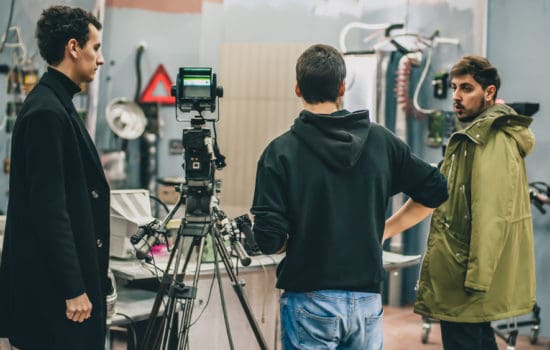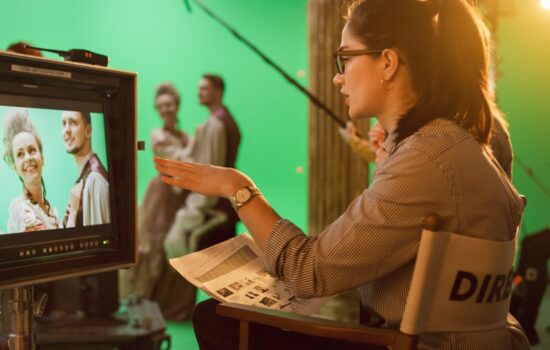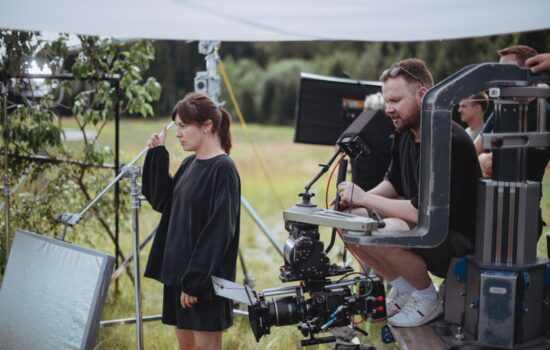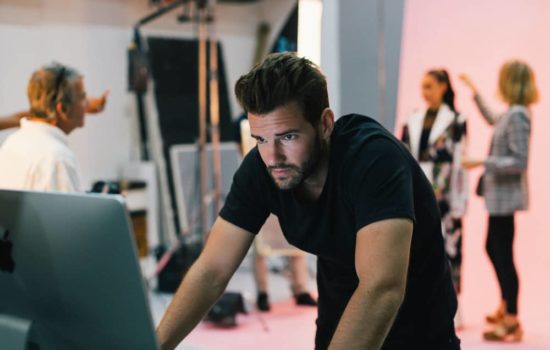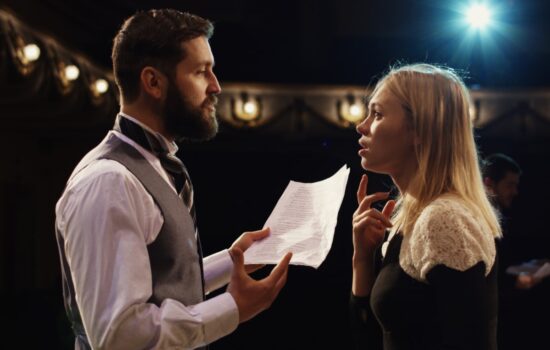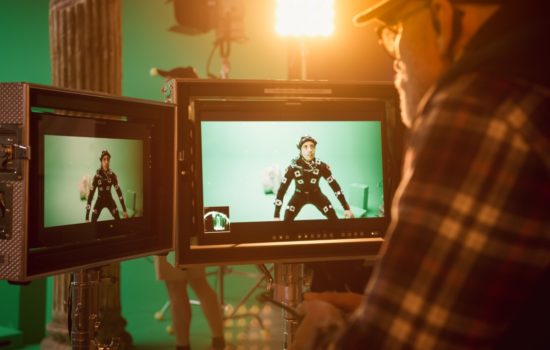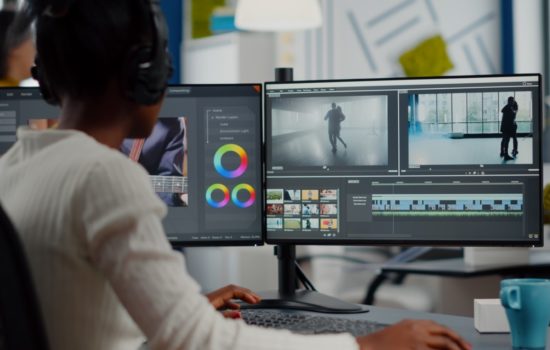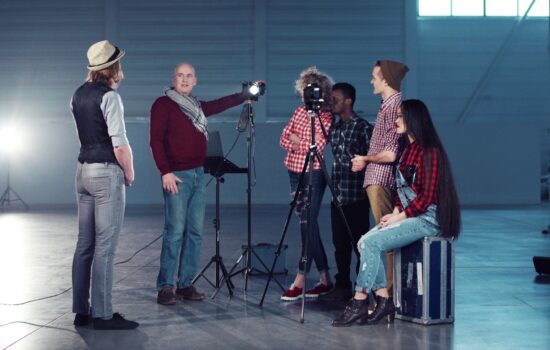Cinematographer
Career Overview
The Cinematographer works with the Director to achieve the overall visual aesthetic of a film, television show, commercial, music video, or other type of content.
Alternate Titles
Director of Photography, DP, DOP
Avg. Salary
$45,353
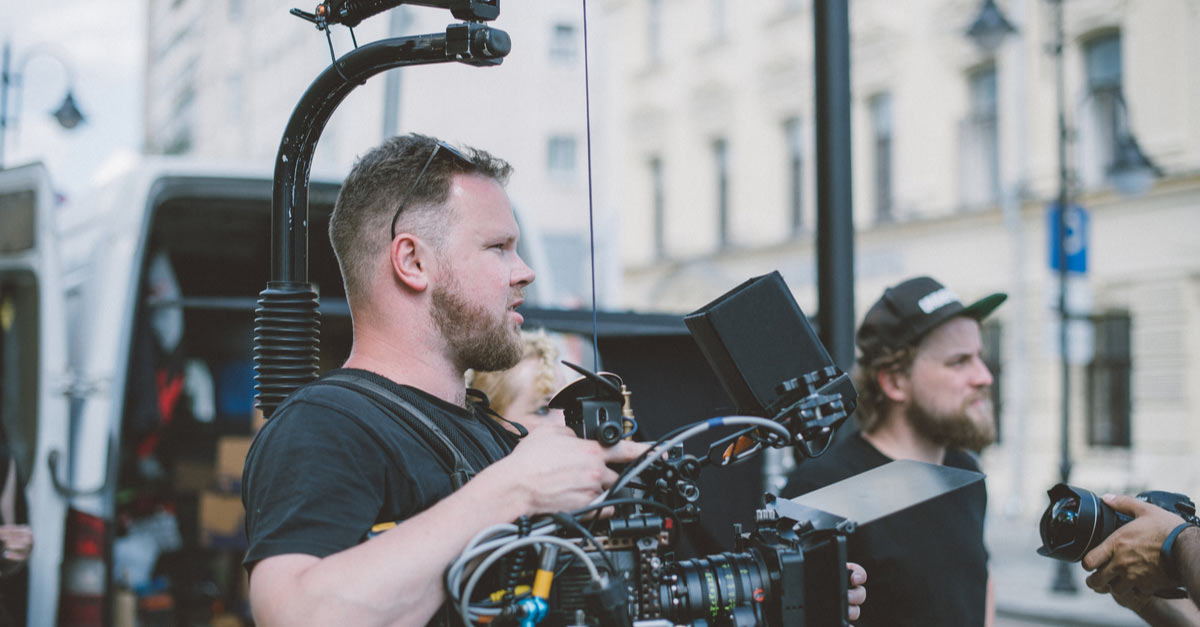
How To Become a Cinematographer
People also ask
Career Description
“A Cinematographer is a visual psychiatrist, moving an audience through a movie… Making them think the way you want them to think, painting pictures in the dark.” — Legendary Cinematographer Gordon Willis (The Godfather, All the President’s Men, Annie Hall)
To learn more about becoming a working Cinematographer, we talked to:
- Adrian Peng Correia (The Flight Attendant, Ramy, GLOW)
- Leland Krane (Sugar Plum Twist, Pope: The Most Powerful Man in History, Over My Dead Body)
- Nicholas Matthews (Music videos for Ice Cube, Rise Against, and Thrice)
- Sandi Sissel (Karaoke Girl, Meet the Browns, The Good Fight)
The logistics of a Cinematographer’s position come down to the fundamentals of film production: pre-production, principal photography, and post-production. The film is essentially conceived three times and it’s the Cinematographer’s job to help shepherd the project through the first two stages and then provide input on the final one.
Pre-production involves strategizing with the Director, getting inside their mind, and figuring out how to craft something that fulfills their interests and wants, even if it’s in unexpected ways. Much of this is listening and taking notes before making suggestions. It’s getting to know the box before it’s possible to step outside of it. Therefore, these in-depth artistic conversations are integral to making decisions later in the process.
The next step is to scout locations with the other department heads and begin to analyze what the potential problems may be. From there, the Cinematographer collaborates with the Director on making a shot list and storyboards that convey the style and structure of the film.
How exactly do you go about creating a career as a Cinematographer? This video explains.
They also depict the color palette, lighting, and camera movement. Most aesthetic ideas are mulled over until production is ready to begin. The other responsibilities of pre-production for a Cinematographer are to work with the Camera, Lighting, and Grip Departments to get the proper gear.
Production is all about management. It’s all about determining what the shooting order is and figuring out how to best collaborate with other department heads. It’s also about staying connected to the moment being capturing and not getting too far ahead or stuck in the past.
Compromises will always have to be made so a lot of the job is looking at the day and realizing what is vital to capture. The easiest way to communicate with the Grip and Electric teams is through making lighting plots and revising them as necessary. It’s the Cinematographer’s job to make sure every shot is usable and flag them when they’re not.
During post-production, in the interim before color correction begins, the Cinematographer reviews images and tries to imagine what they should become. Sometimes creative ideas shot during production will change in the edit so it’s crucial to remain flexible. When it comes time to color the footage, a lot of it is out of the Cinematographer’s control, but it’s important to be present and give creative ideas.
What are the duties of a Cinematographer?
A Cinematographer’s main duty is to represent the story visually, whether it’s television, a short film, a feature, or anything else that’s on the page. The conduit for that is the Director: your job is to understand their vision for the story and help them realize it photographically.
They might be the type of Director that has everything in their head and you’re there to help them execute their vision, point by point, moment by moment. Or it might be something where you’re more of an integral collaborator and contributor to the nature of the vision in prep.
It’s an interesting paradox in that it’s a position that demands focus and artistic intent, but also the ability to put aside your wants and desires for the betterment of others. You have to be both a determined, focused artist with a perspective, and a person who can sublimate their own desires sometimes to be able to tell a story.
When people think of a DP, they think of the creative part and the technical part, which are big parts of being a DP. But the part that people tend to forget is the managerial part. You’re in command of a group of people that you have to get good work out of; work that suits both your vision and the Director’s vision.
You need to communicate what it is you’re trying to do. That’s really important. You have to coordinate with your crew and your managers–the Director, the Producers, post-production–and that’s all about communication. You need the same type of skills they would in any managerial role.
In business school, people take classes on how to manage people and how to manage teams. You’re doing the same thing as a DP. You’re interfacing with other teams. You’re interfacing with production design, post-production, costume design, hair, makeup, wardrobe, etc.
For smaller projects, maybe it’s just you and a Director, or you and a Producer and Sound Man. But when you get to more complex stuff, you’re going to have to think about the communication part. And that’s something that pretty much everybody in film school is going to do. They’re all going to make a short film, or a music video, or something like that.
A Cinematographer is the person who oversees or directs photography and camerawork in filmmaking, especially one who operates the camera.
There’s a philosophical and logistical aspect of working as a Cinematographer. They create part of the emotional throughline of the film by trying to capture both the Director’s and characters’ perspectives in the film.
The visual exploration of themes creates lots of logistics necessary to do the job well. One of the biggest challenges is how to turn creative ideas into effective realities. The audience never knows how much prep was taken or how much change happened on the day of shooting. They only see the final image.
Is a Cinematographer and Cameraman the same?
They are not the same role, but the jobs of Cinematographer and Cameraman can be carried out by the same person.
The Cameraman – or Cameraperson – is often referred to as the Camera Operator because that’s exactly what they do… They are the person who physically manipulates the movement of the camera during a shoot.
Some Cinematographers prefer to have that additional level of control over what the camera is capturing, so for that reason they may pull double-duty as Cinematographer and Cameraperson.
Often, though, the roles are separated out with one person acting as Cinematographer on set and another person acting as the Cameraperson on set.
Salary
What a Cinematographer earns will depend on their level of experience and the nature of the job. For example, a Cinematographer working on a feature film will certainly earn more for their time and talent than a Cinematographer working on a short film or commercial.
Currently, the national average salary for a Cinematographer is $45,353.
Cinematographers working on indie or low-budget projects will also earn less than those working for established production companies. At the top of the hierarchy are the Cinematographers who work on studio films or network television shows.
Cinematographers who have achieved this level of success are generally part of the International Cinematographers Guild, which likewise helps to determine base rates for its members.
It’s important to keep in mind that due to the ebb and flow nature of the entertainment industry, a Cinematographer may go weeks or months without a job. As a result, those seeking a career in cinematography must learn how to budget for those times when they might not be bringing in much or any income.
How much do Cinematographers make?
According to Salary.com, the average salary of a Cinematographer is $45,353 per year. The average salary range is $40,978 to $50,718.
Currently, a union Cinematographer working on feature film with a budget of at least $14 million has a minimum hourly rate of $123.88.
The factors that affect how much a Cinematographer makes in a given year include the number of projects they work on, the budgets of those projects, the duration of the productions, and their union status. As with nearly every other specialty in the entertainment industry, aspiring Cinematographers should expect periods of little to no income on account of these factors.
Hey, what do you think about trying our new Film Career HelperFilm Career Helper really quick? It’s totally free and could help get your career moving fast! Give it a try. It’s totally free and you have nothing to lose.
Career Outlook
A great Cinematographer will always be in demand. And as many longtime Director-Cinematographer collaborations can attest – think Steven Spielberg and Janusz Kaminski or Wes Anderson and Robert D. Yeoman – consistent work can happen for those who find the right collaborative fit.
That being said, like many other specialties in the entertainment industry, most Cinematographers simply go where the jobs are and may collaborate with a Director only once and never work with them ever again.
Outside of the rare circumstance where a Cinematographer may work exclusively in-house at a production or commercial company, those who pursue this field are freelancers. That also means that the hours and length of days for a given job depend on the nature of it. In most cases, the typical day for a US-based Cinematographer will go 12 hours.
Having both the technical and artistic skills central to this line of work is critical for any Cinematographer hoping to enjoy a long and successful career. But before they can show exactly how their expertise can elevate a film or television show, they need to book that job.
What’s the hardest part of becoming a Cinematographer? This professional DP answers this common question.
As a result, a critical part of any Cinematographer’s career is being able to make connections within the industry and continually hustling for that next gig. While having an impressive reel will certainly help a Cinematographer in finding work, they must also be proactive in securing those gigs through the professional relationships they develop and nurture.
That being said, it’s easy to get caught up in the busyness of being a Cinematographer, which is why those in this field recommend being mindful of not letting their profession take over to the detriment of other parts of their lives.
Says Matthews, “It’s important to take time to develop, have a life, and network with filmmakers, even though it doesn’t pay upfront. In the long run, keeping a balance will save a person from burning out and getting stuck in the same level of projects.”
How long does it take to become a Cinematographer?
It takes a lot of time. It took me probably 10–12 years of working in production to really understand the job and then progress to shooting full time. But during that time, I was working in film, making money, and building my career. So, it’s not like you’re gonna be doing nothing, and then suddenly you’re a Cinematographer.
You’ll be working in Grip, Electric, Camera, or some other discipline within the industry, and you work toward becoming a Cinematographer. So as you move up the ladder … you’re building skills that eventually help when you become a Cinematographer.
I didn’t go to film school, but I studied extensively on my own.
Understand that this is an industry where you build the foundations of your career over a good deal of time. Your goals should take into account the fact that you need to have perseverance over the course of a number of years.
When I was signed by my first Agent, the first thing that she asked me was, “Where do you see yourself in five years?” That was something that kind of crept up on me because I realized I needed to have a plan that was much more long-term. I had to understand that if I wanted to become a Cinematographer, there were going to be a number of years where I maybe wasn’t doing the exact things I always wanted to do.
You need to have perseverance and maintain perspective. There will always be ups and downs in terms of where you think you wanna be as opposed to where you are, but you have to understand the nature of the work. If it’s something that you really, really love, then disappointment and the up-and-down nature of it is gonna just be part of the journey. You need to be able to keep fighting.
It’s a process. For me, I worked first as a Gaffer. I went to film school at The New School. I already had some photography skills before I started. For a number of years, I worked as a Grip. I did a little camera assisting, but mostly grip electric and lighting. Then at some point around ‘96, I just said, “I’m going to stop doing everything else and just shoot.”
So there’s a moment for most DPs, and for some people, that’s right out of film school because they’re in a position financially where they’re able to just shoot. I wasn’t. I had to work. Eventually, I thought, “Now I’m in a position where I don’t have to make that much money. I have a roommate, I’m not married, I don’t have kids. I’m going to be able to take a step back, work for free or for low pay, and build my way up again.”
I got out of college in ‘91 and was shooting my first 35 mm feature, which was released in ‘99. So it took about 8–10 years. That’s including film school. For a lot of people, it might take less than that.
Then there are people who work their way up through the Camera Department. That could take 10 years or more. But I would think after 10 years, you’re probably not going to make that switch. If you’re making a living, you’re now 31 instead of 21, and you’re starting to think of a family and so forth–it’s a harder switch to make.
A lot of it is just life stuff. It isn’t anything to do with cinematography in general. Another thing I tell my students is, they need to realize that what they’re choosing isn’t a terribly healthy lifestyle. They need to understand that they’re going to have to work very weird hours.
The light is the light. Sometimes we have to shoot nights. We may go weeks without a job, and then be super busy. It’s bad for relationships. It’s bad for everything. It’s a big sacrifice to do this.
They have to be ready and willing as filmmakers, whether they’re DPs or Directors or whatever. This is not an ordinary job. Most people are aware of that and think it’s sexy to be doing these crazy hours and all that, but when you’re 31, it’s not as sexy anymore.
At 21 you can work all day and stay out until two in the morning, then come home the next day and do it all over again. But when you get a little bit older, it becomes more difficult.
I was still doing overnights up until the whole COVID thing hit. Sometimes I’d get a call saying, “Hey, can you come shoot something right now?” and it would be an overnight. And I’d already have a job for the next day, but I would say yes because it was good money and a good job. Even though It meant I’d be working 36 hours straight. You gotta have some sort of intestinal fortitude.
Cinematographers often need a degree from a film school to begin work. In these programs, you would learn the basics of lighting and camera techniques. Most often one begins as a Camera Assistant and then becomes a Cinematographer.
As soon as a person does the cinematography on a commercial, short film, music video, or documentary then technically you are a Cinematographer. To become a master of light, shooting feature films can take years. One must start somewhere but the learning of one’s craft and becoming a respected artist can take one’s entire career. As techniques and styles change then so must the Director of Photography’s knowledge.
What is a Cinematographer vs. a Director?
The Cinematographer is the leader of the camera department on a shoot and the person responsible for the visual qualities of a film.
The Director is the leader of the production in general who collaborates closely with the Cinematographer to establish the visual look and tone of a movie.
The nature of the collaboration between a Director and Cinematographer can differ greatly from project to project. Some Directors give considerable leeway to the Cinematographer in terms of letting them establish the look of the film. Other Directors essentially tell the Cinematographer exactly what they want the movie to look like and expect the latter to accomplish those desired visuals.
Career Path
In addition to understanding and bringing to life the emotional and visual aesthetic wanted by the Director for a film or TV show, a Cinematographer must also have very technical expertise, including knowing what kind of camera and lighting gear is needed to achieve that aesthetic.
For this reason, the career path of many Cinematographers begins in film school or photography school. Here is where these emerging technicians and artists can learn what it means to use a particular lens for a shot or how the placement of a light will affect the look of a scene.
That being said, it is possible for aspiring Cinematographers to learn on the job. In such cases, they’ll likely come on board a project as an Intern or Production Assistant and soak in as much as they can while simultaneously carrying out their tasks.
Cinematographer or Director? This video breaks down the advantages of each career.
As someone in this role gains more experience, they might be able to work as part of the Grip or Camera Departments where they will be even more fully immersed in the various aspects that a Cinematographer oversees.
Going to school to become a Cinematographer allows an emerging professional to get their start on student films. But even in the absence of a formal learning institution, those wanting to enter this career can gain expertise on small projects like the student projects of those going to school locally or just short films or web series being shot in the area.
Whether school is part of the equation for an emerging Cinematographer, a significant part of their career path will entail finding as many opportunities as possible to learn and hone their craft.
And don’t forget that it’s never too soon to start developing those professional relationships! As early as college or that first PA position, begin making connections. These are your peers and the individuals who will be coming up through the ranks with you.
As an emerging Cinematographer takes on more responsibility and gains more expertise, they’ll likely be asked to work on bigger and potentially more complicated shoots. They may also find themselves overseeing increasingly bigger Camera, Grip, and Electrical Departments, especially if the day comes when they’re shooting a feature film for a major studio.
From there, many Cinematographers (no matter how long they’ve been in the business) will continually educate themselves on the ever-evolving nature of filmmaking and how to create the images desired by a Director.
What makes a good Cinematographer?
Great DPs are those who are liked, respected, and feared. They’re people that know when not to say anything, when to listen, and when to say the right thing to people so as not to offend them but to still get what they want.
The DP has also turned into a firewall against poor quality since we can all see what we’re getting now. Back when I started filming, the videotapes we used were just a representation of what was going to be the final image. Now we’re pretty much seeing what the final image is, or at least close to it.
So there’s a tendency for people on set to say, “That’s good enough, let’s go.” But the DP has to be the firewall and say, “No, this is not good enough. Trust me here. We need consistency. We need to give post [production] what they need.”
We have to satisfy all these different requirements. You want to have integrity in your work and say, “This is something I’m proud to shoot,” no matter what the level of it is. If it’s a corporate video with a talking head, it doesn’t matter if the background is out of focus and nondescript. But if you’re making a short film where it’s important that the background reflects your character’s mood, there’s a different set of restrictions.
You can’t bring the same sensibilities needed for a feature film to the set of a corporate video, because you’re going to take all day and they’ll hate you. And you can’t bring the corporate video sensibilities to the feature film set, because it’s going to look like crap and then they’ll hate you. So you have to work at the appropriate level of each project.
Not everything you shoot is going to be amazing. But if you’re successful, everything you shoot is going to get you hired again. That’s the ultimate goal–to keep working. And that’s mostly about satisfying the client’s expectations and not yours. But you also have to have the integrity to say, “No, I’m not going to shoot this. It just looks bad.”
A Cinematographer, also called a Director of Photography, is the crew chief that is responsible for the camera and light crews. Cinematographers are masters of light and image—the art of visual storytelling used in films and television shows. Anytime the visuals speak to the story of a film then the Cinematographer did a good job.
It’s important to be a considerate person. Cinematography is something that values being able to improvise and create moments of inspiration and insight on the fly. But it also demands someone who is pensive and considerate of not just the artistic elements of a script, but also the practical notions of production. How to execute something within the confines of a budget and a schedule.
You need to be able to honestly assess things with a sense of responsibility in terms of money and time. You need to be somebody who is empathetic to almost everybody. There might be a sound person who’s trying to do their job and you have to compromise some things in order for them to get the proper sound. Or there’s an Actor who needs a certain freedom, and you need to compromise in a way to allow them to deliver the best performance.
It’s complicated — it’s incredibly simple in some ways, then an incredibly complicated job all at once. That’s what makes it so exciting for me.
Is it hard to become a Cinematographer?
The Cinematographer has considerable responsibilities during production and is often considered just below the Director in terms of importance on set. The person in this role must be keenly aware of the many technical aspects of working with cameras, lenses, and lighting, as well as how to evoke the emotional tone that a Director may be seeking for each scene through a film’s visual qualities.
For these reasons, it can be challenging to establish oneself as a Cinematographer in demand. That being said, once a Cinematographer becomes trusted by a Director, they often find themselves that Director’s go-to person for each subsequent film. Consider the long-term professional relationships between Steven Spielberg and Janusz Kamiński or the Coen brothers and Roger Deakins as examples of this.
That being said, for most Cinematographers, it is a career defined by a lifetime of hustling for the next gig and continually networking with others in the industry for future jobs.
Experience & Skills
As mentioned, Cinematographers are both technicians and artists.
They must have a mastery of various types of cameras and lighting equipment. At the same time, they must understand the more abstract and sometimes ephemeral aspects to filmmaking, such as what emotion they hope to elicit with a single shot or how what is framed in a given shot can help to inform character, tone, plot, or all of the above.
These skills – namely the technical ones – can be learned in school and/or on set. However, because technology is always changing, this aspect to being a Cinematographer is a lifelong one. They must continually read up on and become familiar with the most current advances in cameras and lighting equipment.
What are some basic tips every Cinematographer should know? This video offers a look at cinematography 101.
Those less concrete skills must be somewhat inherent to the sensibilities of a Cinematographer, but much can still be learned simply by watching other films and evaluating how others who came before were able to elicit emotions or create indelible images with a lasting imprint.
It’s this unique combination of skillsets that makes Cinematographers so valuable to a film set. It’s also what makes gaining a considerable amount of experience crucial to developing those skills and becoming a Cinematographer whom studios, production companies, and Directors want to work with.
What skills do you need to be a Cinematographer?
- An eye for detail and a mind for fast invention.
- Thorough understanding of lighting techniques, light color, shade, and manipulation.
- Strong technical knowledge of cameras and the film production process.
- Strong communication skills.
- Strong team management skills.
- Excellent listening ability.
- An ability to remain calm during stressful situations.
You have to understand the nature of photography, both as a photochemical and digital process. Also, you have to be in touch emotionally with what storytelling is. You have to understand a bunch of different disciplines.
You have to decide how much to give the audience. Think of it as a spigot. There’s a question of how much you open or close that to the audience based on the moment and the scene. There’s this great scene in The Bad and the Beautiful, which is one of the best movies about Hollywood. This Director is being berated by Kirk Douglas who plays this high-profile Producer. The Producer complains that the Director isn’t playing every moment to its maximum; not directing, so to speak.
You need to have those skills as a Cinematographer. You need to have humility and an understanding of the ebb and flow, the highs and lows of scenes, and how to play to them. And that’s just the artistic side of it.
Then you get into the interpersonal element of what it means to be a Cinematographer in terms of relationships with other people. There’s also management and planning of how to execute the physical nuts and bolts of production. It’s a fascinating career and position to be in as an artist and also, as a practical, functional person who understands management.
Collaboration is a crucial skill, along with problem-solving and adaptability because everything is constantly changing.
The best way to craft a cinematography career is to find skilled individuals and collaborate with them. Find people who share a similar aesthetic and make projects together.
Again, communication is a major thing. But also there’s a real split between the right brain and the left brain. There’s the creative part where you’re imagining things that don’t exist. You’re making things up out of whole cloth. The Screenwriter has some things on a page, the Director has a cast.
Then you get together and the Director may or may not have ideas. You may have to take what’s in their head creatively and turn it into the form of a film.
Then there’s the technical part, which is the other side of the brain. There are plenty of DPs out there who don’t know much technically, but they have a feel for it. What some lack in technical skills, they make up for it by their understanding of photography.
Then there are other DPs who have much more technical adeptness. Many of them will claim that they don’t. They tend to downplay that. But it can be a real benefit to have both the technical knowledge or the ability to surround yourself with people with the right technical knowledge.
There’s so much technology in cinema. Not only with the lights but with the cameras and the LEDs. Technology’s always been a big part of filmmaking. We’ve always used technology and pushed the envelope in terms of photography. In many ways, film ends up being the cutting edge of photography.
You need to understand that stuff. If not every bit of it, because there’s so much to know, at least have an intuitive understanding of it. What will different cameras give you? What are the main creative aspects? Then you have to weigh those creative aspects against the technical aspects.
We all want to shoot something that looks like it was on an Alexa 65–one of the most expensive camera systems in the world. And it’s incredibly heavy. Maybe you don’t want to do that for your short film. Even if you can afford it, it may be the wrong thing because your location is small or your Director will want to move quickly and be very lithe.
Maybe you want to shoot it more like a Cassavetes movie and use a little, tiny camera. Maybe you want to use a DSLR camera because that’s the right camera for the job.
So you need to have both sides of that in your brain. You really can’t have just one. You can’t think you’re just gonna walk on the set and get beautiful images while not knowing any of the technical stuff.
Education & Training
It’s a common refrain in Hollywood that you don’t really need to go to school to become a professional in any of the specialties such as acting, directing, or screenwriting.
That may be true, but because of the considerable technical skillsets that Cinematographers must have to be successful at their job, emerging professionals should consider some type of formal training to become at least proficient at understanding how the many camera and lighting elements work for a given shot, scene, and film.
Because cinematography is an involved craft, many film schools have programs and majors devoted solely to learning it. If a traditional four-year college or university isn’t an option, aspiring Cinematographers can learn through abbreviated programs such as UCLA Extension or as part of more general filmmaking classes like those given online through MasterClass.
A key benefit of receiving any kind of formal education in cinematography is becoming familiar with essential terms used on the job, such as:
- Aspect ratio
- Bounce it
- Catchlight
- Chimera
- Depth of field
- Dolly
- F-stop
- Last looks
- Martini shot
- Rack focus
- T-stop
- Video village
Looking for some cinematography inspiration? Take a look at these iconic-looking films.
For the person who wants to just learn on the job, they can, but it may (in some instances) take just as much time as earning a traditional degree in cinematography. It takes time and trust as an entry-level professional like a Production Assistant to get someone like the Cinematographer or Camera Operator on set to explain what they’re doing and why.
While going to college or getting gigs as an Intern or Production Assistant can certainly provide a starting point for a career in cinematography, it’s still encouraged that aspiring professionals use their free time to explore with cameras, lighting setups, and small projects to gain additional experience.
The life of a Cinematographer is one where learning and growing is part of the package, which is why those looking to enter this field should take advantage of every possible opportunity to develop their skills.
What qualifications do you need to be a Cinematographer?
One must have knowledge of the camera to be used, whether it be using film or a digital camera. The Cinematographer must understand lighting and the types of lighting instruments needed for capturing the images. Most importantly, one must understand how to tell a story visually in tandem with the Director.
Cinematography is not a job that rewards right away. If you think of what it means to be an apprentice, it benefits from putting in a great deal of time to understand what it means to make a film or to make television.
I started as a Production Assistant. In terms of qualifications at the beginning, I really didn’t need much. Coming in as a Production Assistant, one thing that you have to do is be punctual, responsible, and be a good listener. Be able to follow directions, and be able to delegate responsibility and accept it. Be a hard worker. Those things are simple.
You have to be mindful. You have to be attentive, and you have to be present, because as a Production Assistant, everyone else is more important than you. So you have a certain selflessness that’s built into you through that very first ground-level job. And that selflessness, that desire to make everyone around you better and serve the needs of others as a Production Assistant are things that are the foundation for any good person working on set. That’s basically how you start.
Then, as you become a Cinematographer, those qualifications serve you. Obviously, you need knowledge about photography, lighting, and how to work within the confines of a schedule and a budget. Those things come with experience. They aren’t things you understand immediately. You need time to be able to understand production as its own thing within the system.
The only time you’re really gonna understand it is when you start to do it, whether that’s out in the world working in film, or working on student productions in film school. That’s maybe the best benefit of being in film school.
It helps you understand the world in a very specific manner, and then behind that, you have all of this theory, intellectual development, development of critical thinking, and the way to dramatically or comically access material. That all comes with film school.
One school of thought is that film school helps you think creatively and opens your mind to new ideas. You may love a certain Photographer, like Ansel Adams, but when you go to film school, they show you a whole bunch of new Photographers that you can then draw inspiration from.
You’ll also learn a lot of technical stuff, but you can learn the technical stuff on your own. And the creative stuff you may already have before you go to film school. So what’s the real reason to go to film school? It’s the connections. The people you ultimately work with are very often the people you went to film school with.
So film school can be really important for making those contacts and forming a core group of people you can go out and make things with. Whether those are paid projects or passion projects, you’re going to meet those people in film school.
If you just start working as a PA, or even as an Intern Grip or Electric, you may not be able to form a good circle of people, because you’re not going to have contact with every department. In film school, you’re going to have Directors, Composers, Editors, a whole plethora of people.
The other qualification that’s really important is the ability to communicate. If you’re a wallflower, this is just not the right field for you. You can do screenwriting. You can even do directing. I’ve met Directors that barely talk to anyone but their Actors. But the good DPs know how to communicate.
A friend who is a commercial DP said, “The only thing that really matters is good taste.” You have to ask yourself, “Am I good at choosing things that people like and respond to, and not just things that make me happy?”
When you get dressed in the morning, if you’re the kind of person that can put together an outfit that you like and that other people will like–this is just a metaphor–that’s a good sign that you have some taste. You’re gonna have to make decisions of taste every moment as a DP. Everything else can be learned.
You can’t be intimidated by the technical stuff. You can’t be a person who’s like, “Ah, computers! I hate those.”
Producers and Directors are only interested in seeing cinematography work so if someone becomes stuck in another position, they’ll have to invest time and money into reinventing themselves.
A Cinematographer should have a reel on an updated website. People must be able to identify them as a Cinematographer to hire them.
Fun Facts
The International Cinematographers Guild includes nearly 8,500 members.
Rachel Morrison became the first female Cinematographer nominated for Best Cinematography by the Academy Awards in 2017 for her work on Mudbound.
Cinematographers Leon Shamroy (Planet of the Apes, Cleopatra, The King and I) and Joseph Ruttenberg (Gigi, Mrs. Miniver, Woman of the Year) share the distinction of having won the most Academy Awards for Best Cinematography at four apiece.1
From 1939 to 1967, separate Academy Awards were given for color cinematography and black-and-white cinematography2.
Additional Resources
Matthews notes, “The most valuable online resource is on the forum of legendary Cinematographer Roger Deakins’ (No Country for Old Men, O Brother, Where Art Thou?, The Shawshank Redemption) website.
On this site is much information to scour. Deakins also answers questions. Another great resource is the ‘Ask David Mullen Anything’ thread on reduser.net. There are over 500 pages of info on the thread and he answers questions on a regular basis.”
Bruce Block’s book The Visual Story is a great resource for understanding the elements of visual storytelling. Aspiring Cinematographers should also explore and read up on other filmmaking departments, as understanding them will help to improve collaboration.
Those interested in joining the International Cinematographers Guild can look to it for more information on becoming part of this union, as well as details on ICG events and cinematography-specific articles.
FAQ
What do you want aspiring Cinematographers to know?
Never lose sight of the fact that, even if you’re working on something you hate, you’re still the artist you thought you were when you started. It’s part of the process. Don’t get discouraged. You’re still the artist you started out as.
What is the single biggest suggestion you would give to someone wanting to get into this career?
The best advice for a Cinematographer is to make sure they can be booked. This involves networking, constantly updating their website, adding to social media and crafting relationships with talented people.
Often Producers and Directors make recommendations to their friends. Even sending cold emails to people and telling them you appreciate their work can be effective in acquiring a meeting. It’s a game of relationships so the better at networking one is, the more likely they will be hired.
What’s the #1 mistake people make when trying to get into this career?
One of the biggest mistakes for new Cinematographers is an emphasis on gear versus the actual image being created. An audience will never know or care how something was made. They just care about what they are seeing.
The overemphasis on technology is propagated by some of the equipment manufacturers but also by a lack of understanding of what makes a beautiful image. The camera can only capture what is in front of it. If the acting, locations, and framing are bad, even the most expensive camera will feel cheap. The image doesn’t need to be ‘pretty,’ it just needs to mean something for the story.
What is the question people should ask about this career but rarely do?
What is the intent behind an image?
People never ask about why an image works for an aesthetic. This isn’t something for just the Director to ponder; the Cinematographer has to know what it means, as well. They have to add their own artistic intent or else they’re just acting as a lackey for someone else’s needs.
It’s their job to serve the Director’s vision but knowing why something is done makes it easier to collaborate. The Cinematographer must be an active participant, adding depth to the story to be successful.
What is one thing I should have asked which I didn’t?
What is the lifestyle of a Cinematographer beyond the work?
It’s important for people to realize how competitive the film industry is and how much devotion it takes to succeed. The job becomes the Cinematographer’s life. They end up thinking about films all the time. It also poses a strain on friends and romantic relationships because Directors of Photography must leave for months at a time when working on feature films.
It’s difficult to find a balance in the Cinematographer life, especially since there is a lot of mental anguish when not working. It takes a lot of courage and self-belief to maintain a personal life as well as a professional life while working as a Cinematographer.
If you could describe in one word what makes you successful, what would it be?
Precision.
Sources
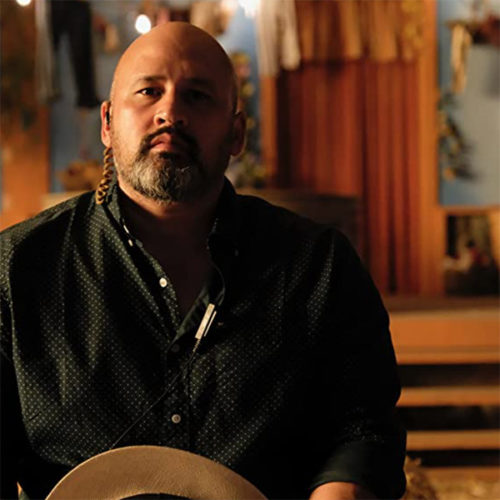
Adrian Peng Correia
Adrian Peng Correia is an award-winning Cinematographer, who has lensed projects all over the world. Over the last decade, he has shot dozens of feature films, commercials, documentaries, and short films.
His work can be seen in Ramy, GLOW, The Flight Attendant, Love Life, and After Adderall.
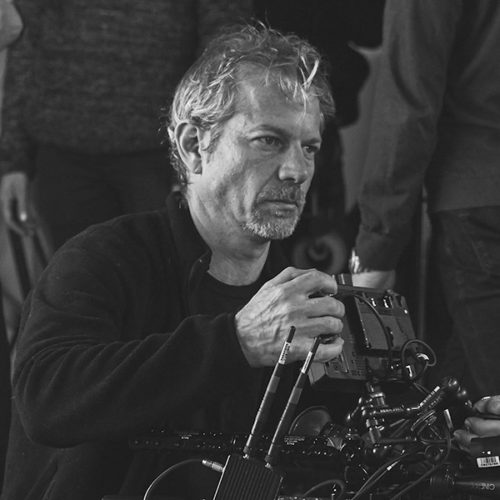
Leland Krane
Leland Krane is a New York-based Director of Photography with over twenty years of experience in film and television. He moves from operating camera on a dozen major TV productions, including The Americans, Bull, Luke Cage, Iron Fist, and High Maintenance, to shooting shows for History, Discovery, Investigation Discovery and Comedy Central. He shoots and directs promos and commercials which air in the US, Europe, and online.
Leland’s feature cinematography credits include more than a dozen films, with stars such as Academy Award-winning actress Melissa Leo, Elizabeth Banks, Frank Vincent, Dabney Coleman, Vincent Pastore, and Ali Larter. Most recently he shot for William Brent Bell, Director of The Boy, both additional photography and second unit. In 2018, second unit for Stano and Iron First. Separation both main and 2nd unit.
Camera System agnostic, Leland prefers to find the right camera and workflow for the project, be that Film, Arri, RED, SONY, Panasonic, Canon or other systems; There is no “one size fits all” in the ever-changing digital ecosystem.
From carrying sandbags and cable to lensing movies he has always believed talent is not enough, hard work and perseverance are far more important than gear, but solid connections earned through work are paramount.
Leland’s work has been recognized by American Cinematographer, Indiewire, and the Wall Street Journal. He has taught Cinematography at The New School, SUNY Purchase, Maine Media Workshops and guest lectured at NYU and the High School for Film and Television.
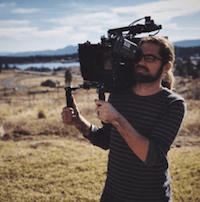
Nicholas Matthews
Hailing from the South and the Midwest, Nicholas Matthews is an award-winning Los Angeles-based Cinematographer. He has shot five feature films in Mexico City, Colorado, the Mojave Desert, and Los Angeles, starring actors Isabel Lucas (Knight of Cups), Alexandra Parks (The Royals), Gerardo Taracena (Apocalypto), and Jose Sefami (Amores Perros).
His work has screened at the Nashville Film Festival and Hollyshorts, to name just a couple. Recently, the LA Times called his work on border thriller The Boatman“more art film than action film; deliberately paced, skillfully shot, emotionally challenging.”
He has also worked with celebrities Ice Cube, Kylie Jenner, Rainn Wilson, Grace Helbig, Paul Scheer, and the band Rise Against. He has worked with MAGIC! on commercials and music videos. He thrives on collaboration in finding each project’s unique voice. For more advice from Matthews, check out this profile by Pro Video Coalition and his appearances on the podcasts Super Secret Filmcast and Art Vs. Commerce.
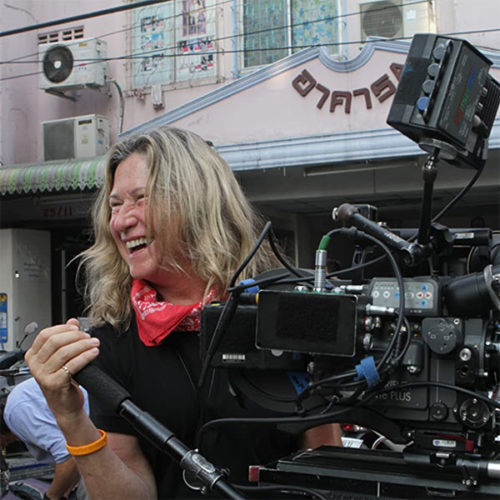
Sandi Sissel
Sandi Sissel began her career as a Cinematographer at NBC and ABC where she won two Emmy awards for her work on Her Majesty’s Britannia and covering the war in Vietnam. During the ’70s and ’80s, she shot countless segments for ABC’s 20/20, Saturday Night Live, and 60 minutes.
Among her numerous Academy Award and Emmy-winning documentary credits are Seeing Red, The Wobblies, Americas In Transition, El Salvador: Another Vietnam, Mother Teresa, Jane Goodall: Chimps So Like Us, Blood In The Face, Chicken Ranch, Broken Treaty At Battle Mountain, Krik Krak Tales Of A Nightmare, Calling The Shots, Speaking Our Peace, Heavy Petting, Chisholm 72: Unbought and Unbossed, Free Angela, Witness To War, Going Upriver: The Long War Of John Kerry, Lord God Bird, One Heartbeat and Before Stonewall. She received a Bafta Award nomination for her work on The Endurance. She photographed the Imax film Roving Mars.
In addition, she has been Director Of Photography on the network television series Class Of 96, The Flash, Young Americans, Matt Waters, Philly Heat, Night Stalker, Night Sins, and the Emmy Award-winning Wonder Years. She also shot the Emmy Award-winning mini-series Drug Wars. Among the cable and television movie credits are In The Echo, Toothless, Suddenly, Radiant City, Great Mom Swap, Dad, The Angel and Me, In The Company Of Darkness, Keeping Secrets, It’s Nothing Personal, and For Richer, For Poorer.
Sandi served as Director Of Photography on the Academy Award-nominated motion picture Salaam Bombay, which received the Camera D’or at Cannes. In addition, she photographed Yellow Card, Barney’s Great Adventure, Drug Wars: The Camerana Story, Soul Of The Game, The Reef, Camp Nowhere, Full Eclipse, Double Switch, Drop Dead Fred, Drag Strip Girl, The People Under The Stairs, Passion’s Way, New York Minute, and Tyler Perry’s Meet The Browns.
She has been 2nd Unit Director Of Photography on major films including Uncle, Black Knight, Exit Wounds, Rock Star, Austin Powers: The Spy Who Shagged Me, Roommates, Daredevil, Stealing Harvard, The Believers, Mr. and Mrs. Smith, Allan Quartermain, and the City Of Lost Gold, The Ballad Of Jack and Rose, Blow, Cellular and the Academy Award For Cinematography winning Master and Commander: The Far Side Of The World. She also received a Satellite Award nomination for Master and Commander.
Sandi has directed Chicken Ranch, Highwire, Cowgirls, Looking Good America, and HBO’s Nerve: Natacha Merritt.
In 1994 Sandi received the Kodak Crystal Award for Lifetime Achievement from Women In Film. She has appeared in the films Visions Of Light, Shooting Women, and Women Behind The Lens.
Sandi is a member of the International Photographers Local 600 and Women In Film. She was inducted into the American Society Of Cinematographers in 1994 and the Academy Of Motion Picture Arts and Sciences in 2004.
References
- 1Sharp, Nathan. "The 10 Cinematographers With The Most Oscar Nominations". Screenrant. published: 28 May 2021. retrieved on: 29 July 2021
- 2Various Authors. "Academy Award for Best Cinematography". Wikipedia. published: 2021. retrieved on: 29 July 2021
